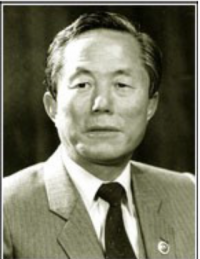Difference between revisions of "Historical background (TAEKWONDO YOKSA) for 9th KUP exam"
m (Changed layout) |
m (Changed layout) |
||
| Line 1: | Line 1: | ||
| − | [[Theory::Background]] '''<span style="color:white; background:white">[[Subject::{{PAGENAME}}]]</span>''' '''<span style="color:white; background:white">[[Level::K9]] | + | |
| + | <noinclude> | ||
| + | '''<span style="color:white; background:white">[[Theory::Background|Historical background /]]</span>''' | ||
| + | '''<span style="color:white; background:white">[[Language::English|Main Menu|]]</span>''' | ||
| + | '''<span style="color:white; background:white">[[Subject::{{PAGENAME}}]]</span>''' | ||
| + | '''<span style="color:white; background:white">[[Level::K9|Exam 9th Kup]]</span>''' | ||
| + | </noinclude><br> | ||
| + | |||
=== Historical background (TAEKWONDO YOKSA) for 9th KUP exam === | === Historical background (TAEKWONDO YOKSA) for 9th KUP exam === | ||
Taekwondo is no ordinary sport, such as football or tennis. It is a martial art. Therefore, there are certain traditions and customs of the ancient Asia (in our case Korea) attached to it, therefore, is a certain philosophy behind it. To better understand for what tae-kwon-do actually stands for, here are some important notes about the origins, history, philosophy and principles of this Korean defense art. In the East exists more than one martial art, originally practiced by monks, farmers, etc., each of them usually had to defend themselves against attackers with bare hands and feet without weapons. Korea was no exception. One of the Korean "martial arts" was Taek Kyon. From 1909 to 1945, Korea was occupied by Japan. The rulers tried insist their own martial arts (ex. Judo, karate, etc.), for example, by prohibiting the Korean arts to the Koreans. Though the Korean arts were sometimes practiced in secret to maintain and to save them for future generations. <br> | Taekwondo is no ordinary sport, such as football or tennis. It is a martial art. Therefore, there are certain traditions and customs of the ancient Asia (in our case Korea) attached to it, therefore, is a certain philosophy behind it. To better understand for what tae-kwon-do actually stands for, here are some important notes about the origins, history, philosophy and principles of this Korean defense art. In the East exists more than one martial art, originally practiced by monks, farmers, etc., each of them usually had to defend themselves against attackers with bare hands and feet without weapons. Korea was no exception. One of the Korean "martial arts" was Taek Kyon. From 1909 to 1945, Korea was occupied by Japan. The rulers tried insist their own martial arts (ex. Judo, karate, etc.), for example, by prohibiting the Korean arts to the Koreans. Though the Korean arts were sometimes practiced in secret to maintain and to save them for future generations. <br> | ||
Revision as of 11:42, 31 January 2020
Historical background /
Main Menu
Historical background (TAEKWONDO YOKSA) for 9th KUP exam
Exam 9th Kup
Historical background (TAEKWONDO YOKSA) for 9th KUP exam
Taekwondo is no ordinary sport, such as football or tennis. It is a martial art. Therefore, there are certain traditions and customs of the ancient Asia (in our case Korea) attached to it, therefore, is a certain philosophy behind it. To better understand for what tae-kwon-do actually stands for, here are some important notes about the origins, history, philosophy and principles of this Korean defense art. In the East exists more than one martial art, originally practiced by monks, farmers, etc., each of them usually had to defend themselves against attackers with bare hands and feet without weapons. Korea was no exception. One of the Korean "martial arts" was Taek Kyon. From 1909 to 1945, Korea was occupied by Japan. The rulers tried insist their own martial arts (ex. Judo, karate, etc.), for example, by prohibiting the Korean arts to the Koreans. Though the Korean arts were sometimes practiced in secret to maintain and to save them for future generations.
In 1938, Choi Hong Hi (the person who in 1955 will establish Taekwondo) departed to Japan to study. In two years, he also earned a black belt in karate there. On his return to Korea, he devoted himself to the liberation of his country, and he was arrested and ended up in a Japanese prison. In 1945, Korea was liberated. Choi became a lieutenant in the Korean army. Increasingly he realized that Korea had to get back their own martial art. Choi Hong Hi began developing new techniques and late 1954 was laid the foundation for a new Korean martial art, which was named Taekwondo on April 11, 1955. On the spiritual level is derived from the traditional taekwondo Korean ethical and moral values.
Even if it were taek kyon and karate sometimes used as a reference at the physical level, the techniques based on scientific principles (especially the laws from physics) shows that Taekwondo is different martial art (ex. wave motion and the relationship strength-relaxation.)
Meanwhile, Choi became General, so that he could introduce his sport first to the army. In 1966 (April 22), the International Taekwondo Federation (ITF) was established. As a result of the political pressure and the growing frictions between North and South Korea, General left again his homeland in 1972; he settled in Canada.
In South Korea WTF (World Taekwondo Federation) was founded in response. Both forms of taekwondo have the same base but they are so grown apart, that the differences are greater than the similarities.
The General with the evolution of the times and the changing needs of society made more adjustments. The ITF Taekwondo was not only under the influence of its founder, it is an evolving sport also. On June 15, 2002 General Choi died. Master Tran Trieu Quan (VIII degree then) was elected president of ITF. The present President of ITF is CHANG UNG.
In a summary :
Taekwondo was founded in 1955 in Korea by General Choi Hong Hi, on April 11; it was the first time when the name "Taekwondo" was used. ITF was founded in 1966. Tae-kwon-do has approximately 3,200 techniques.
